Q&A, AUTOGRAPHS WITH NANCY ALLEN, PIPER LAURIE, P.J. SOLES
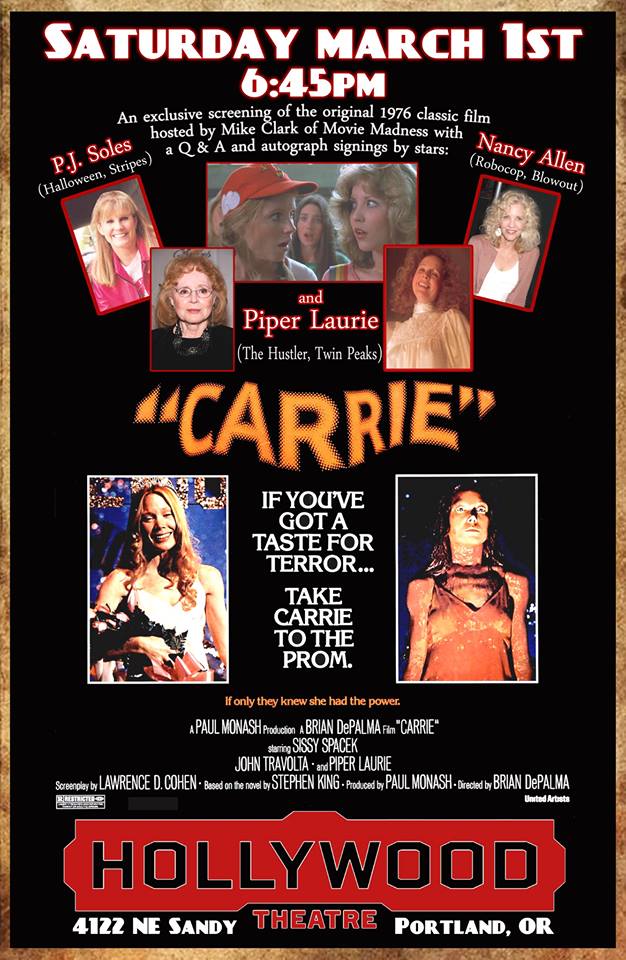
 Hello and welcome to the unofficial Brian De Palma website. Here is the latest news: |
|---|
E-mail
Geoffsongs@aol.com
-------------
Recent Headlines
a la Mod:
Listen to
Donaggio's full score
for Domino online
De Palma/Lehman
rapport at work
in Snakes
De Palma/Lehman
next novel is Terry
De Palma developing
Catch And Kill,
"a horror movie
based on real things
that have happened
in the news"
Supercut video
of De Palma's films
edited by Carl Rodrigue
Washington Post
review of Keesey book
-------------
Exclusive Passion
Interviews:
Brian De Palma
Karoline Herfurth
Leila Rozario
------------
------------
| « | February 2014 | » | ||||
| S | M | T | W | T | F | S |
| 1 | ||||||
| 2 | 3 | 4 | 5 | 6 | 7 | 8 |
| 9 | 10 | 11 | 12 | 13 | 14 | 15 |
| 16 | 17 | 18 | 19 | 20 | 21 | 22 |
| 23 | 24 | 25 | 26 | 27 | 28 | |
De Palma interviewed
in Paris 2002
De Palma discusses
The Black Dahlia 2006

Enthusiasms...
Alfred Hitchcock
The Master Of Suspense
Sergio Leone
and the Infield
Fly Rule
The Filmmaker Who
Came In From The Cold
Jim Emerson on
Greetings & Hi, Mom!
Scarface: Make Way
For The Bad Guy
Deborah Shelton
Official Web Site
Welcome to the
Offices of Death Records

Peter Sobczynski, RogerEbert.com
"If you ever wondered what the result might be if the screenplay for a Brian De Palma thriller somehow landed in the hands of the late, great Russ Meyer, Nurse 3D is the film for you. Director Douglas Aarniokoski and co-writer David Loughery have concocted a film that plays like an explosion in a warehouse of grindhouse film prints. Within the course of a mere 86 minutes, they jam in gallons of blood, ridiculously ripe performances, tons of beyond-purple dialogue (with the tone set early on when Abby narrates Danni's first encounter with a gory fatality with the instant classic 'She lost her virginity and the blood flowed') and so many scenes involving showers, locker rooms and fetishy outfits that it sometimes feels as if All Saints may be the first hospital to require a two-drink minimum along with proof of insurance."
Devin Faraci, Badass Digest
"If Brian De Palma had directed Nurse 3D it probably could have been something amazing. In the hands of Doug Aarniokoski it’s more of a campy delight. The film straddles the line between serious and silly in all the right ways, never being tongue-in-cheek but also not taking itself too seriously. The film was inspired by the photography of Lionsgate’s chief marketing officer Tim Palen, and every now and again there’s a composition so striking and so well-done that I wonder if Palen lent his eye on the day. A scene where Abbie watches Danni in the hospital shower is perfectly shot, as is one where two characters run down a spiral staircase. Many of the scenes between these gorgeous set pieces are flat (and like, really flat, a problem with a 3D movie), lit with garish reds and blues like Creepshow.
"But the movie is a blast. It’s absolutely over the top, and while it has real slow spots (like every single legit exploitation movie) by the end it is so crazy - Abbie goes on a pointless killing spree in the ICU during a chase - that you’ll be clapping and hollering, just like a grindhouse crowd in 1974. This is definitely a film to watch with a crowd (or at least some friends; the 3D is so useless that seeing it at home will make no difference. Also, it’s only playing in a handful of theaters), and it’s definitely a movie that could have a future as a midnight staple."
Frank Scheck, The Hollywood Reporter
"While the film might have been a guilty pleasure had it been made by the likes of Brian DePalma or Larry Cohen -- not to mention Abel Ferrara, whose similarly themed Ms. 45 is a classic of the genre -- director Doug Aarniokoski and co-screenwriter David Loughery fail to infuse the overly familiar elements with the necessary dark humor."
Ed Gonzalez, Slant
"No sense of moral complication arises from the elaborate and conspicuously far-from-evidence-free bloodbaths that Abby sets into motion against her pussy-blockers. Rather than capture truly pained souls tangled in exuberant horror tropes, the filmmakers settle for retrograde anguish and warmed-over artistry. This isn't idea-rich trash like Passion, a fizzy symphony of terror that commented on personality as mediated by image recording. Capturing evidence of Danni's accidentally cheating ways doesn't complicate Abby, only reveals her to be cut from the same crazy quilt as your garden-variety movie psychopath. Of course, that Nurse 3D suggests a worst-case-scenario gene splice of Orphan and Side Effects, which is to say it's exactly the film that Brian De Palma's naysayers think they see whenever they patronize one of the auteur's works, it at least succeeds in proving the adage that one man's trash is another's treasure."
Jason Shawhan, Nashville Scene
"Director/cowriter Douglas Aarniokoski has a gift for stylish sleaze. There’s one sequence involving a pas de deux on a spiral staircase that has all the elegance of Brian De Palma’s Dressed to Kill museum pursuit — and in 3D, it’s magnificent. There are also moments that flail about and thud against the walls of cheap studios. You never really know what exactly is going to happen visually, which certainly makes Nurse a different kind of suspense film."
Ryan Turek, Shock Till You Drop
"De La Huerta’s Abby Russell is a nurse by day and a man-eater by night until she meets Katrina Bowden’s Danni, who she develops an unhealthy relationship with – one that involves bad decisions, a three-way, photographs and blackmail. When Danni ultimately rejects Abby’s advances, the story takes a De Palma-esque turn and Abby begins to set Danni up for a string of murders."
 Last month, NBC's Community returned to the network for its fifth season, and with creator Dan Harmon thankfully back in control of the series. In episode 2, titled "Intro To Teaching", several of the main characters sign up for a class called "Nicolas Cage: Good or Bad?" The instructor, ensuring the class on day one that "there is no answer," gives them the task of watching five Nicolas Cage films, "no marathons-- space out your viewings." Abed, of course, goes on a marathon, and drives himself crazy trying to work out the answer that clearly does not exist. At one point, he has run wires in his apartment with the names of Cage's films clipped onto them in a seemingly endless flow of titles. Crazed, he tells his concerned friends, "If you watch closely at the seven-minute mark in Snake Eyes, you'll notice the moment where an alien arm could have come up and..."
Last month, NBC's Community returned to the network for its fifth season, and with creator Dan Harmon thankfully back in control of the series. In episode 2, titled "Intro To Teaching", several of the main characters sign up for a class called "Nicolas Cage: Good or Bad?" The instructor, ensuring the class on day one that "there is no answer," gives them the task of watching five Nicolas Cage films, "no marathons-- space out your viewings." Abed, of course, goes on a marathon, and drives himself crazy trying to work out the answer that clearly does not exist. At one point, he has run wires in his apartment with the names of Cage's films clipped onto them in a seemingly endless flow of titles. Crazed, he tells his concerned friends, "If you watch closely at the seven-minute mark in Snake Eyes, you'll notice the moment where an alien arm could have come up and..."Abed responds, "All actors are crazy, Annie. Some crazy actors are good, some are bad, but none of them are neither. There's no such thing as both. Which one is Nicolas Cage, huh? Huh, oh--" [Abed ends in a Nicolas Cage-type spasm].
A year ago, after Harmon was ousted from the show (he missed all of season four), he had lamented at CommuniCon that he never got to do the Nicolas Cage episode he'd wanted to do.
Vulture quoted Harmon discussing the idea: "The thing about Nicolas Cage movies is … unless you’re a total cynical dick, you have to embrace the fact that Nicolas Cage is a pretty good actor. He's done a lot of weird, dumb movies, but that was supposed to be the point of the episode — that Nicolas Cage is a metaphor for God, or for society, or for the self, or something. It’s like — what is Nicolas Cage?"
Perhaps taking an obsessive cue from Abed, I captured the frame at the seven-minute mark of Snake Eyes... as well as every seven minutes after that. You can see the frames below:
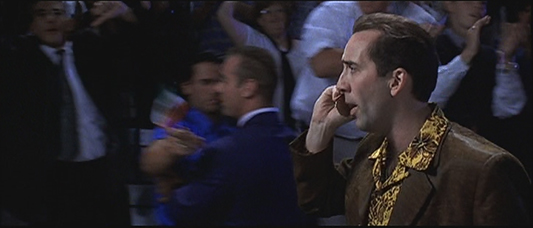
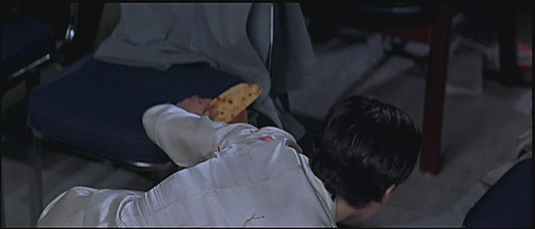
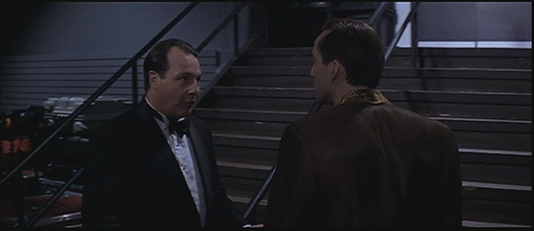
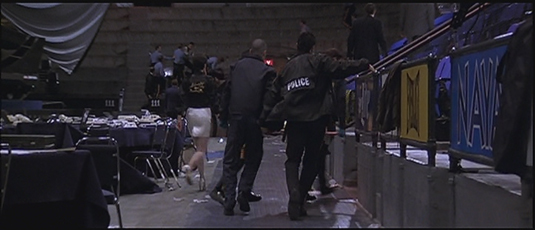
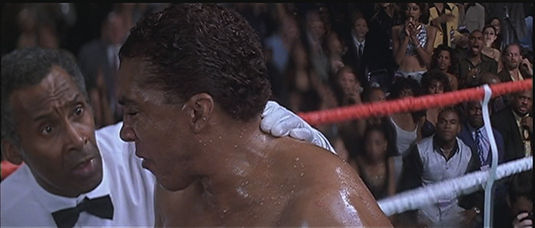
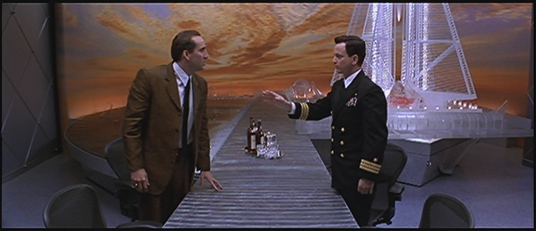


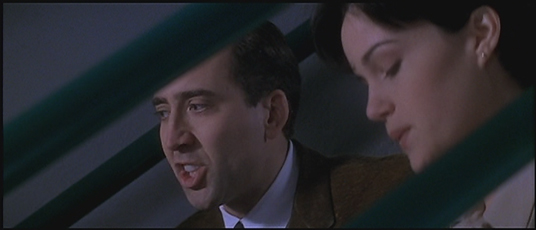
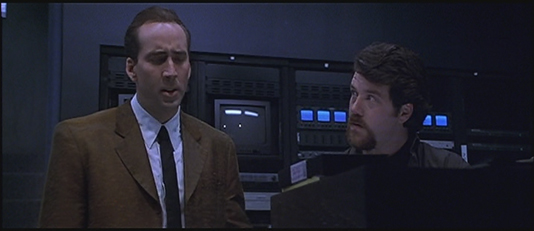
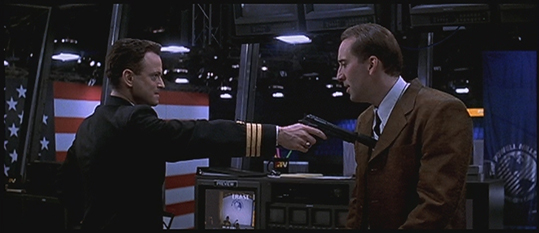

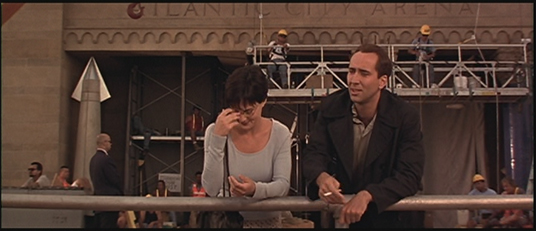
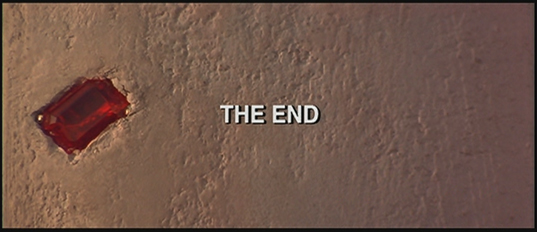
 I hadn't seen this before, but stumbled upon it just now. It's an article by HitFix's Drew McWeeny from March 2009, in which McWeeny visits the set of Matthew Vaughn's Kick-Ass. We have previously noted Vaughn's love of some of De Palma's gangster movies, but here McWeeny notes the resemblance of the mask worn by Nicolas Cage in Kick-Ass to that of the Phantom in Brian De Palma's Phantom Of The Paradise. The mask complements a costume that was inspired by Batman's, and both mark a change from the comic book version of the Big Daddy costume, which was more a sort of ski mask and a trench coat.
I hadn't seen this before, but stumbled upon it just now. It's an article by HitFix's Drew McWeeny from March 2009, in which McWeeny visits the set of Matthew Vaughn's Kick-Ass. We have previously noted Vaughn's love of some of De Palma's gangster movies, but here McWeeny notes the resemblance of the mask worn by Nicolas Cage in Kick-Ass to that of the Phantom in Brian De Palma's Phantom Of The Paradise. The mask complements a costume that was inspired by Batman's, and both mark a change from the comic book version of the Big Daddy costume, which was more a sort of ski mask and a trench coat.Watching Cage working on the set, McWeeny notes that his character seems to be talking, in costume, like Adam West, who played Batman in the '60s TV series. This leads to a very interesting couple of conversations between the two. Here's an excerpt from McWeeny's article:
Instead, he put out his hand and introduced himself. I did the same, and he asked what it was that made me laugh. I could feel Matthew watching me, curious to see what I'd say, so I explained that the choice to use Adam West's cadence was so crazy but so inspired that the laughter was involuntary.
"And I gotta say," I continued, "I love the 'Phantom of the Paradise' mask." He gave me a sharp look, then looked at the mask again and smiled.
"You think so, eh?" He held it sideways for me, so the profile was visible again. Unmistakable. "Do you know that film well?"
"I do," I said. "It's one of my faves. I love De Palma, but that's one of his that I have a special affection for."
"That's the film that made me want to make movies," Nic replied.
"Okay. Let me ask you something. What year was 'Phantom of the Paradise' released?"
"Uhhh... 1974, I think?"
"And what year did 'Star Wars' come out?"
"1977. Definitely."
"Do you think the design of the Phantom had any influence on the design of Darth Vader?"
"Well, sure. All in black. Helmet. Breathing device on the chest. Cape. De Palma was a friend of George's back then. I can totally see that being an influence."
He smiled and, without saying anything else, headed back onto the set. I felt like I'd passed a test of some sort.
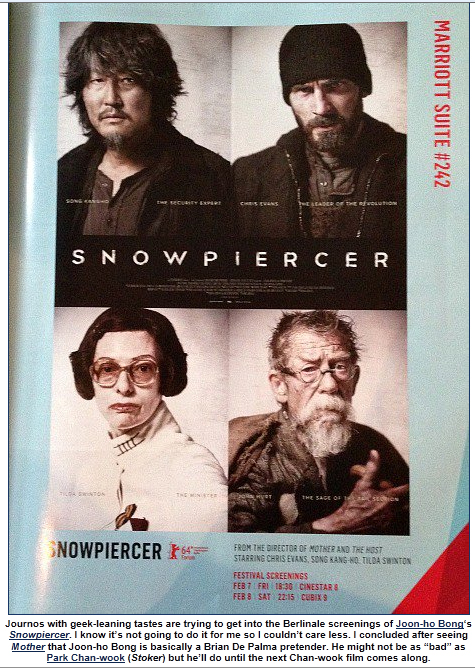 Posting the other day from the Berlin International Film Festival, Jeffrey Wells stated that "Journos with geek-leaning tastes are trying to get into the Berlinale screenings of Joon-ho Bong‘s Snowpiercer. I know it’s not going to do it for me so I couldn’t care less. I concluded after seeing Mother that Joon-ho Bong is basically a Brian De Palma pretender. He might not be as 'bad' as Park Chan-wook (Stoker) but he’ll do until the next Chan-wook film comes along."
Posting the other day from the Berlin International Film Festival, Jeffrey Wells stated that "Journos with geek-leaning tastes are trying to get into the Berlinale screenings of Joon-ho Bong‘s Snowpiercer. I know it’s not going to do it for me so I couldn’t care less. I concluded after seeing Mother that Joon-ho Bong is basically a Brian De Palma pretender. He might not be as 'bad' as Park Chan-wook (Stoker) but he’ll do until the next Chan-wook film comes along."This led Film Freak Central's Bill Chambers to tweet, "Wells calling Bong Joon-ho a Brian De Palma pretender might be the most ill-informed thing he's ever written in the last two days." (See the whole tweet with responses below.) As we noted in 2009, Wells caught a screening of Mother at that year's Cannes Film Festival, and, writing again at his Hollywood Elsewhere blog, called it "a richly stylized Brian De Palma-esque thriller about a mom who mightily endeavors to prove that her mentally handicapped son, accused of killing a young girl, is innocent. There's no doubting that Bong Joon Ho is a De Palma devotee in the same way that De Palma was a Hitchcock acolyte in the '70s and '80s. Mother was by far the most interesting sit because of his immaculate and exacting composition of each and every element. The result is consistently flourishy and at times operatic -- deliberately unnatural, conspicuously acted, very much a director's film. Ho is coming, however, from a fairly well-worn genre place, although I'll give him points for delivering a surprising third-act twist."
And it turns out that perhaps Wells is on to something with the De Palma comparison. At last fall's Busan International Film Festival, according to Twitch, Joon-ho mentioned that as a kid, he was inspired by American films that he later learned were made by the likes of De Palma and John Carpenter. The trick is that Joon-ho did not yet understand English, and so he developed his imagination by reconstructing the stories of the films in his head.
Joon-ho mentioned this during a double-interview with Quentin Tarantino, moderated by Scott Foundas. Tarantino headed out to the festival just to meet Joon-ho after he'd heard from a mutual friend that they were hanging out with Joon-ho at the fest. Twitch's Kwenton Bellette, who posted the selective transcription of the discussion, wrote that, reportedly, "insiders" were suggesting that Joon-ho had been "extremely unhappy" with edits to Snowpiercer, apparently mandated by the notoriously edit-happy Weinstein Company. Bellette speculated that, as "Weinstein stock", Tarantino had been sent there to calm Joon-ho down, but it seems more likely that Tarantino was simply there because he enjoyed Joon-ho's films.
Joon-Ho's citing of De Palma and Carpenter came after Tarantino answered Foundas' question about which filmmakers from Asia had been an inspiration. Here is What Joon-ho said: "I must say my hero in Korean film must be the director of the original Housemaid, Kim Ki-young. Other than this, when I was a kid we have a Korean American broadcast station. At midnight I would sneak out and watch these very sexual and very violent movies. Later I learned these were films by directors like John Carpenter and Brian De Palma, but at the time I could not understand any English so I reconstructed the stories of them in my head, which greatly helped my imagination."
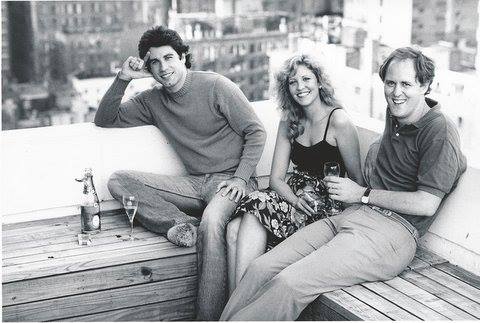
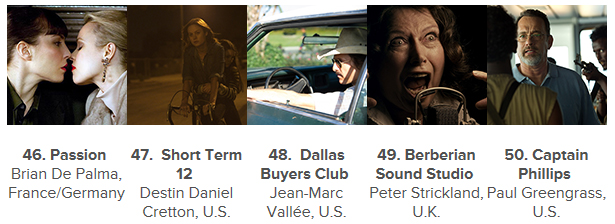
1. Upstream Color
2. A Touch Of Sin
(Then alphabetical)
The Act Of Killing
Bastards
Emperor Visits The Hell
No
Passion
Spring Breakers
12 Years A Slave
Wadjda
Nathan Lee
(Contributing Editor to Film Comment)
1. Le Pont du Nord
2. "Slumber Party Alien Abduction"
(from V/H/S/2)
3. Gravity
4. Faust
5. Spring Breakers
6. The Lords Of Salem
7. Stranger By The Lake
8. The Grandmaster
9. Passion
10. Dark Skies
Previously: 'PASSION' - 2013 YEAR-END LISTS AND MENTIONS
See also: 'PASSION' ON MORE TOP 10 LISTS FROM 2013
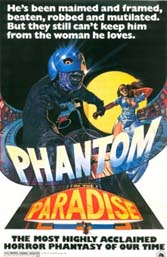 The digital restoration of Brian De Palma's Phantom Of The Paradise will be screened next Friday, February 14th at the Colonial Theatre in Phoenixville, Pennsylvania. "Celebrate Valentine’s Day at The Colonial with an unconventional love story," Brendan Carr writes of the screening at the Colonial Theatre website. The screening begins at 10:15 pm. (Thanks to the Swan Archives for the news!)
The digital restoration of Brian De Palma's Phantom Of The Paradise will be screened next Friday, February 14th at the Colonial Theatre in Phoenixville, Pennsylvania. "Celebrate Valentine’s Day at The Colonial with an unconventional love story," Brendan Carr writes of the screening at the Colonial Theatre website. The screening begins at 10:15 pm. (Thanks to the Swan Archives for the news!)
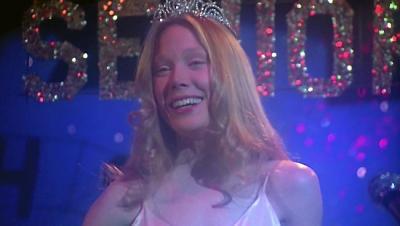 "Sissy Spacek: Seemingly Lost" is the name of a February film series at The Trylon in Minneapolis. The series of four films began this week with Terrence Malick's Badlands, and includes Brian De Palma's Carrie February 24th and 25th. "Best known for her disarming innocence," states the series' description, "Sissy Spacek boasts an amazing range. Conveying naivete and sadness, her performances reveal a woman who knows exactly where she’s going. The Trylon showcases four of her most complex and challenging roles." The other two films are Robert Altman's 3 Women and Costa-Gavras' Missing.
"Sissy Spacek: Seemingly Lost" is the name of a February film series at The Trylon in Minneapolis. The series of four films began this week with Terrence Malick's Badlands, and includes Brian De Palma's Carrie February 24th and 25th. "Best known for her disarming innocence," states the series' description, "Sissy Spacek boasts an amazing range. Conveying naivete and sadness, her performances reveal a woman who knows exactly where she’s going. The Trylon showcases four of her most complex and challenging roles." The other two films are Robert Altman's 3 Women and Costa-Gavras' Missing.Hewitt states that "Carrie features Spacek's peerlessly sad/scary performance as the title character, a bullied high school student who lashes back after she's pranked at prom. Spacek, 25 when she shot it, has no problem convincing us she's a teenager. Director Brian De Palma's movie is a stylish, bizarrely successful experiment in tone. Piper Laurie, as Carrie's violently fundamentalist mom, behaves as if she's in a comedy, which somehow makes her even more frightening. It launched many a movie career, including Nancy Allen's, Amy Irving's and John Travolta's. But the reason it all hangs together is that you can't take your eyes off Spacek's timid-but-all-powerful Carrie, a victim who declines to be victimized."

Shaviro continues, "But Jonze does sort of (inadvertently?) display the hollowness of the aching sincerity that has come to prominence in our recent (white, liberal, well-meaning) culture as an impotent reaction formation against the hyper-cynicism of official Capitalist Realism. I vastly prefer the 'post-irony' of films like Joseph Kahn’s Detention to the non-ironic sincerity of Her; but they are both reactions against the same thing, the way that hip irony, or what Sloterdijk long ago called 'cynical reason', is the 'official' affect, as it were, of 'there-is-no-alternative' neoliberal capitalism."
Shaviro concludes, "Ultimately, Her is the exact inverse, or the flip side, of a much better film — Brian De Palma’s recent masterpiece Passion. De Palma shows the actuality of neoliberal subjectivity, in which everything is vicious competition in the service of self-entrepreneurship, with female sexuality as the linchpin of the whole structure. In contrast, Jonze shows neoliberal subjectivity’s self-deluding idealization of itself as total sincerity, maintaing this emotional nakedness and yearning within the parameters of a world in which 'sincerity' can itself only be a commodity, or a form of human capital to bring on the market. And the punchline is that even this self-congratulatory idealization is a weak and unsustainable facade. It is ultimately too hollow and sad to serve even its ideological function. Most self-delusions are self-congratulatory and even megalomaniacal; but Theodore’s self-delusion, which is also that of all the other human beings he meets (or for whom he works, writing 'handwritten' personal letters for other people) is lame, vapid, and devoid of true imaginativeness. Her — rather than The Matrix — is really the film whose motto should be, 'welcome to the desert of the real.'”